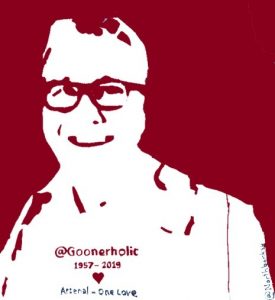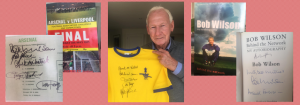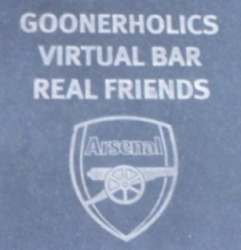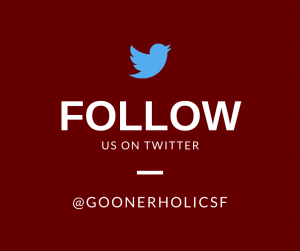The last time we were top of the league at Christmas and went on to win the title was in 1947.
Few, if any, in this bar, save Dr F.’s interlocutor in the previous, most excellent post, will remember that Christmas. American crooner Buddy Clark topped the UK pop charts with An Apple Blossom Wedding, Cambridge University has just admitted women into full membership and Princess Elizabeth had married her Greek prince just a month before.
Life was drab, austere and wearing. Rationing was still in effect, and London was bombed out and exhausted. The devastating V-1 rocket hit in 1944 at Highbury Corner was a fresh memory. (It is why the Corner isn’t a corner anymore.) At the stadium, the North Bank terracing and South Stand were newly repaired from bomb damage during the Blitz.
When league football had resumed after the war, we were a shadow of our great pre-war sides. We flirted with relegation for most of the 1946-47 season; the 13th-place finish flattered.
Refresh, revive
Yet manager George Allison was putting elements for a revival into place, buying Welsh left-back Walley Barnes, veteran England wing-half Joe Mercer and the mercurial Scottish winger Ian McPherson from Southampton, Everton and Notts County, respectively.
Jimmy Logie, a Scottish inside right of the small and skilful ilk who had signed for the club in the summer of 1939 (timing is everything!), had made his league debut, playing ahead of right-half Paddy Sloan, newly acquired from Tranmere Rovers. Laurie Scott, signed before the war but unable to get a first-team game, also made his debut. George Swindin, later to manage the club, became the undisputed first-choice keeper.
Ronnie Rooke joined mid-season from Fulham, an unlikely recruit, 35 years old and a lower-league journeyman centre-forward. Yet he blossomed in red and white. A relegation-averting 21 goals in 24 league games in 1946-47 would be followed by 33 in 42 in 1947-48, the only 30+ goal haul between Ted Drake in 1934-35 and TH14 in 2004-05.
Rooke formed a prolific striking partnership with another centre-forward, Reg Lewis, who like Swindin and the Compton brothers had played a handful of games for the 1937-38 title-winning side.
Time was also wearing away the remaining older heroes of the 1930s. Cliff ‘Boy’ Bastin, the Robert Pires of his day, and Bernard Joy would retire in the close season. Bryn Jones, bought in 1938 to replace the incomparable Alex James, but another who lost their best years to the war, started to be phased out; so, too, George Male, the greatest full-back of 1930s, although there would be a twist to his tale.
Whittaker’s world
Allison, too, retired at the end of the 1946-47 season. Adding the final touches would fall to his successor, Tom Whittaker, the third manager of the Herbert Chapman dynasty. Whittaker had qualified as a physio after injury cut short his Arsenal playing career in 1925 when he was 27 years old. His innovations in Arsenal’s conditioning of players and rehabilitation of the injured as first-team trainer were critical to Chapman and Allison’s success in the 1930s.
As the new manager, he replaced Sloan, later the first Irishman to play in Serie A, with a less attacking wing-half, West Ham’s Archie Macaulay. That let him deploy Mercer, now captain, even deeper, to orchestrate the team Partey-like from in front of a defence of Swindin, Scott, now England’s right-back, and Barnes, shortly to be Wales’s left-back, with Les Compton between them.
Allison had converted Compton from a middling right-back in the reserves into the reserve first-team centre-half. With Joy’s retirement, the position became his own. Thirty-five and the club’s longest-serving player, Compton was about to embark on the Indian summer of his career, including in 1950 becoming the oldest player to win a first England cap.
Whittaker’s adjustments were transformative. A defence that had leaked 70 goals the previous season conceded just 32 on its way to the title, keeping 21 clean sheets in 42 games.
Whitaker’s other signing was a young, two-footed winger, Don Roper, from Southampton. Like McPherson, Roper could play on either wing. The pair provided flexible cover for Les Compton’s younger brother Denis, first-choice on the left wing but frequently unavailable because of cricket or a dodgy right knee injured in a collision with Charlton’s goalkeeper in 1938.
Flying start
The 1947-48 season got off to a perfect start, with six straight wins, opening with a 3-1 win at Highbury over Sunderland (highlights https://www.britishpathe.com/video/arsenal-3-sunderland-1-soccer-seasonss-flying-star/query/arsenal ). Six more wins and five draws extended the unbeaten run to 17 games.
It ended on November 29 at the Baseball Ground. That Derby County won with the game’s only goal was down to Swindin’s keeping. The Pathe newsreel of the game doesn’t show a single Arsenal attack.
Yuletide arrived without further mishap and was celebrated with a 3-1 Christmas morning win at Anfield. We were top of the table, three points clear of Burnley after 22 games and seven ahead of Preston North End, who had played one game more.
Two days later, ‘Scouthland’, as the match programme described our visitors (the people take their name from a sailors’ stew that is a contraction of lobscouse since you ask), won the return fixture 2-1 on a wet Saturday that turned Highbury into a quagmire, our first home defeat. Whittaker was still playing Chapman’s pass-and-run game using his modified WM formation. Lesson one for Arsenal is that ‘they cannot tip-tap their way to success through heavy going’, opined the Daily Herald.
Cup shock
Another unexpected home loss came on January 10, in the FA Cup 3rd Round against Second Division Bradford Park Avenue (highlights https://www.britishpathe.com/video/VLVA2B58EHMHBXFRX3N5K5PF1F4CT-ARSENAL-VS-BRADFORD-IN-THE-THIRD-ROUND-OF-THE-FA-CUP/query/arsenal ). However, the league points continued to accumulate. Defeat would not strike again until the end of February, a 4-2 reverse at Villa Park.
Three more defeats would await before the end of the season, two at Highbury, including against Chelsea in mid-March that started a stuttering run-in. A side with an average age of 30 was running out of steam. We won just three of our final ten games but had a nine-point cushion to fall back on.
The first of these three wins was a 7-0 thumping of Middlesborough at Highbury on Good Friday, with Rooke getting a hat-trick and Denis Compton a brace.
The next day, we played Blackpool — in Blackpool — fielding nine of the team that had played 24 hours earlier, and lost 3-0. On Easter Monday, we were at Middlesborough, where the identical team that had won 7-0 three days previously drew 1-1.
Three games in four days over the Easter holiday involving just 13 players. Rotation? Bah! We used only 19 players all season, with seven playing at least 40 games and another three more than 30.
Title secured
Two weeks after Easter, it was off to Leeds Road, Huddersfield. A 1-1 draw earned the point that secured a sixth title with four games to spare. However, the team did not know it until they saw the newspapers at Doncaster Station on the way home. Second- and third-placed Manchester United and Burnley had lost and could no longer close the gap.
The season wound down with another loss to Derby and scoreless draws at Portsmouth and Manchester City but ended with a spectacular May Day thrashing of relegated Grimsby, 8-0 at Highbury.
George Male, who had played three games for the club’s first side to win the First Division in 1931 and was an ever-present in the 1933, 1934, 1935, and 1938 Championship sides, was given a valedictory game against Grimsby. Though deep into his thirties, he played eight times in the 1947-48 season when Barnes or Scott was injured, making him the first person to play in six title-winning seasons. After hanging up his boots, he had a long career as an Arsenal coach and scout, discovering Charlie George.
We had led the league for all but three days in September when we were second on goal average. We ended seven points clear of the Mancs and Burnley: P42 W23 D13 L6. GF 81 GA 32. At home, W15, D3, L3; away: W8, D10: L3.
Lessons from three-quarters of a century ago? Avoid lengthy injuries to key players, and don’t lose away games you can’t win.
-0-









That’s a superbly researched piece, Ned and a most enjoyable read. It’s a great prophylactic for impending Arsenal withdrawal symptoms.
A great read, Ned, you must compliment the monks for excellent research.
Thanks Ned for an evocative piece.
When I was a kid our extended family would often gather for a Sunday picnic “in the country.” The pre-lunch football match would often be punctuated by my dad scoring what he claimed was another “Ronnie Rooke special.” Living in the space between Drake and Henry is a very reasonable achievement indeed.
UTA.
Thanks Ned, and belatedly, Dr F for a couple of excellent pieces.
One a trip down memory lane and the other a trip of a different
kind 😃
Ned,
My dear old Dad would have loved this piece just as much as I did. We’ve discussed here before the great tone ‘ Forward Arsenal’ a book I devoured as a boy and which created dreams of an Arsenal team that would one day win trophies .
Ronnie Rooke was a particular favourite of Dad, he described him as having a shot like a sledgehammer. He saved us from relegation one season and won us the title the next. That’s quite an Arsenal epitaph .
Imagine C100 schlepping up to Anfield on Christmas morning . Curry for Christmas dinner on the way back ! And imagine how little those poorly remunerated players saw their families over Christmas
Different days but wonderfully described and a real insight into the history of our great club . Thanks Ned
Not to be impertinent or disrespectful but Maguire says he thinks England feel they can win the WC. I would say there’s an equal chance he will fall over like Humpty Dumpty.
https://www.bbc.com/sport/football/63896720
And equal is being kind.
For Noosa and TTG, there is a Ronnie Rooke special towards the end of this:
https://www.britishpathe.com/video/arsenals-first-defeat
Thanks Ned! A delightfully revisited slice of unforgettable Arsenal history. As you mentioned earlier in the comments of the previous piece, nearly 15 years after his untimely death Chapman’s Arsenal was still winning league titles playing football inspired by him.
I will bookmark this piece and add it it to Faustus Jr.’s essential reading list.
Thanks, Ned. A excellent read.
Thanks Ned !
Enjoyable as ever and an eye watering amount of research all pieced seamlessly together 👏🏻👏🏻
One or two of the regulars know my father worked at the Times and played football for them.
He was delighted that they acquire as a coach in 1947…..one Ronnie Rooke ! Dad was very taken with him as a person and he was apparently a pa5ient and helpful coach. And he didn’t take a penny in earnings for doing it .
He went into management of course after his playing career ended.
A 3-0 win over Lyon in Dubai today. Vieira scored a beauty
Thanks, all. I am glad you enjoyed your history lesson. It is important we don’t forget the past even as we look to the future.
On the subject of Ronnie Rooke, he cost £1,000 plus two players, Cyril Grant, a centre forward who had made two appearances in 1946, and Dave Nelson, a wing half who made 29 appearances, including eight for the 1937-38 title-winning team, and another 164 during the war. I am not sure which was the makeweight in the deal, the two players or the two monkeys. Either way, we ended up with the better end of the deal.
Re: “Lessons from three-quarters of a century ago? Avoid lengthy injuries to key players, and don’t lose away games you can’t win.”
I don’t think we have much control over the injuries question, so the crystallization of Ned’s wisdom seems to center on not losing away games you can’t win. A point gleaned from an away draw here and there can be very significant at season’s end.
bt8@15: the injury point was a bit tongue in cheek, knowing we have lost Jesus for a bit. The draws were even more valuable when they were worth half a win rather than one-third of a win as they are today. But equally, they cost your opponent two points. Two points denied can be as or more significant than one gleaned.
Good to hear that Eddie scored, we’ll be needing lots of that.
This is an interesting ‘exclusive’ on Benjamin White from a less than top drawer publication:
https://www.dailystar.co.uk/sport/football/exclusive-ben-white-england-qatar-28689236
Not really a surprise if you consider he never watches football!
A far better reason for his homecoming for ‘personal reasons’ than the rumours of serious pathology and he’s never been a problem for the Arsenal coaches as far as we know.
Doesn’t seem to make more or less sense than any other of the rumours. The wall of silence around the true reason is quite remarkable.
>>>>>>>